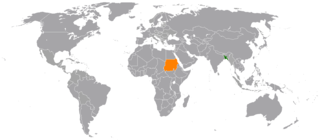Mohammad Yakub Ali Chowdhury was a Bengali essayist and journalist. He was noted as one of the few Bengali Muslim literary scholars of his time.

Dhaka (Dacca) is a modern megacity with origins dating from 500 BC to 200 BC. The history of Dhaka region begins with the existence of urbanised settlements that were ruled by Gupta Empire, Gauda Kingdom, Pala Empire and Chandra dynasty before passing to the control of the Sena dynasty in the 10th century CE. After the reign of Sena dynasty, the region was ruled by the Hindu Deva dynasty of Bikrampur.

In 1971, the Pakistan Army and their local collaborators, most notably the extreme right wing militia group Al-Badr, engaged in the systematic execution of Bengali intellectuals during the Bangladesh Liberation War of 1971. Bengali intellectuals were abducted, tortured and killed during the entire duration of the war as part of the Bangladesh genocide. However, the largest number of systematic executions took place on 25 March and 14 December 1971, two dates that bookend the conflict. 14 December is commemorated in Bangladesh as Martyred Intellectuals Day.

Hakim Habibur Rahman was an Unani physician, litterateur, journalist, politician and chronicler in early 20th-century Dhaka.

Nāṣir ad-Dīn Naṣrat Shāh, also known as Nusrat Shah, was the second Sultan of Bengal belonging to the Hussain Shahi dynasty. He continued with his father's expansionist policies but by 1526, had to contend with the Mughal ascendency in the Battle of Ghaghra. Simultaneously, Nasrat Shah's reign also suffered a reverse at the hands of the Ahom kingdom. The reigns of Alauddin Husain Shah and Nasrat Shah are generally regarded as the "golden age" of the Bengal Sultanate.
Ruknuddīn Bārbak Shāh was the son and successor of Sultan Nasiruddin Mahmud Shah. Initially appointed as the governor of Satgaon during the reign of his father, Barbak ascended the throne of the Bengal Sultanate in 1459. He was the first ruler to give prominent roles in the Sultanate's administration to the Abyssinian community. Historian Aniruddha Ray credits Barbak Shah as the pioneer of urbanisation in Bengal.

Barishal Zilla School, popularly known as BZS, is a public educational institution for boys, located in Barisal, Bangladesh. It was the first high school established in Barisal Division. Founded as Barisal English School on 23 December 1829 by W. N. Garrett, it began with 27 students. In 1853, the school was renamed Barisal Zilla School.
Shāhzāda Bārbak, known by his regnal title as Ghiyāsuddīn Bārbak Shāh, was the Sultan of Bengal in 1487 and the founder of the Sultanate's Habshi dynasty. He was a former commander of the palace-guards of Jalaluddin Fateh Shah court.
Nawab Bahadur was a title of honour bestowed during Mughal Empire and later during British Raj to Indian Muslim individuals for faithful service or acts of public welfare.

Bilateral relations exist between Bangladesh and Austria. Relations between the two countries have been considered cordial with both the countries working towards further strengthen it. Bangladesh has an embassy in Vienna which also serves as the Permanent Mission of Bangladesh to the United Nations and other international organizations.

Bangladesh–Sudan relations refers to the bilateral relations between Bangladesh and Sudan. Colleges in Bangladesh, like the Sher-e-Bangla Medical College, have hosted students from Sudan.

Shāh ʿAlī al-Baghdādī was a 15th-century Muslim missionary and Sufi saint based in the Faridpur and Dhaka regions of Bengal.

Sikhism in Bangladesh has an extensive heritage and history, although Sikhs had always been a minority community in Bengal. Their founder, Guru Nanak visited a number of places in Bengal in the early sixteenth century where he introduced Sikhism to locals and founded numerous establishments. In its early history, the Sikh gurus despatched their followers to propagate Sikh teachings in Bengal and issued hukamnamas to that region. Guru Tegh Bahadur lived in Bengal for two years, and his successor Guru Gobind Singh also visited the region. Sikhism in Bengal continued to exist during the colonial period as Sikhs found employment in the region, but it declined after the partition in 1947. Among the eighteen historical gurdwaras in Bangladesh, only five are extant. The Gurdwara Nanak Shahi of Dhaka is the principal and largest gurdwara in the country. The Sikh population in the country almost entirely consists of businessmen and government officials from the neighbouring Republic of India.
Ashrafuddin Ahmad Chowdhury was a Bengali politician who had served as general secretary of the Congress Party's Bengal branch, member of the East Bengal Legislative Assembly and later as the education minister of Pakistan. He was an advocate of Huseyn Shaheed Suhrawardy's United Bengal proposal.
Human rights in East Pakistan is about human rights in East Pakistan.
Abul Faraḥ Muḥammad ʿAbdul Ḥaque Farīdī was a Bangladeshi educator and author. In recognition of his contributions in the field of linguistics, he was awarded a Bangla Academy Fellowship. Faridi was the founder of Islamic Foundation Bangladesh's Islami Bishwakosh project and also worked closely with Bangladesh Scouts.

The secretary general of the Bangladesh Nationalist Party is the executive officer of the Nationalist Party, a political organization in Bangladesh. The secretary general has direct control over all departments in the party. The secretary general also serves as an advisor to all departments when not directly making decisions. The secretary general has holistic view over a wide range of issues, ranging from staff appointments to dismissal and approval of the Party's executive branch members. The secretary general is also responsible for verifying documents, including election expenditures, and delegating functions among the party's organisational editors in consultation with the party chairman.
The Kohinoor was a Bengali language newspaper, first published in July 1898. Initially focusing on miscellaneous topics such as Islamic culture, its third relaunch was a pivot of Hindu-Muslim harmony. The paper targeted both Hindu and Muslim clientele.

Tanda, also known as Tandah and Khwaspur Tandah, was a historic 16th-century city of Bengal in the eastern part of South Asia, and one of the most prominent medieval capitals; serving the Karrani Sultans of Bengal and the early Mughal governors of Bengal.













